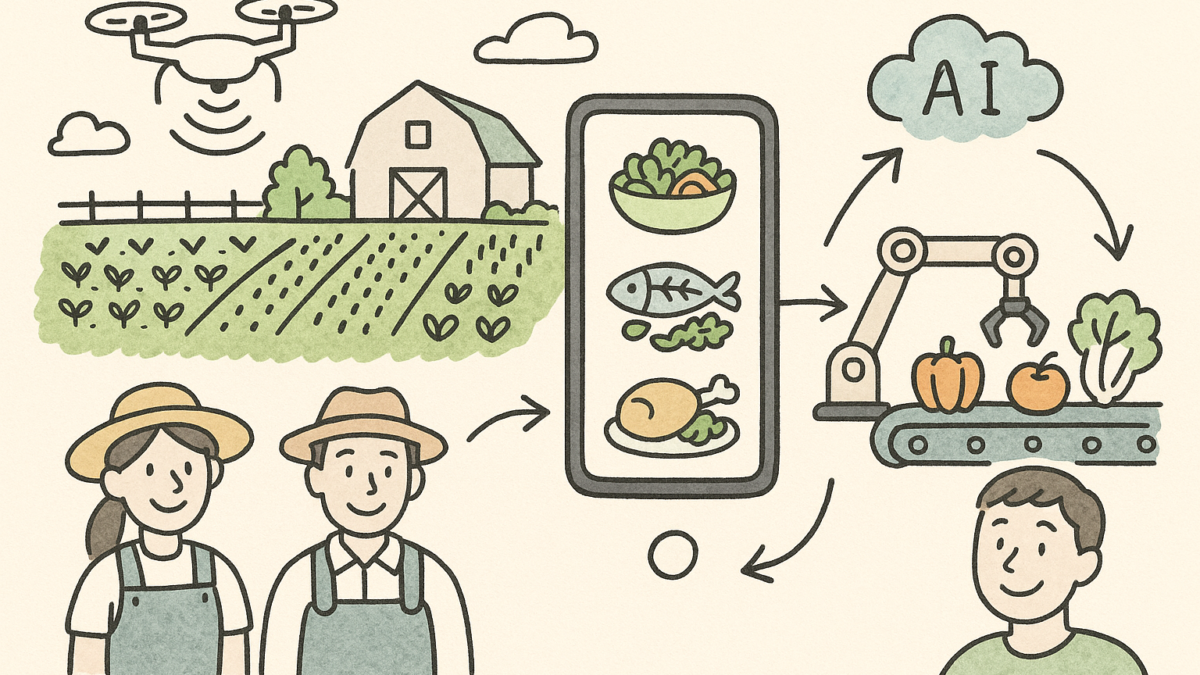AI in the Food Industry: Transforming How We Grow, Produce, and Consume Food
Table of Contents
Introduction
Artificial Intelligence (AI) is no longer just a buzzword—it is reshaping industries across the globe, and the food industry is one of the fastest adopters of AI technologies. From improving crop yields to enhancing food safety and personalizing nutrition, AI is revolutionizing the way food is produced, processed, and consumed. This blog dives into the key applications of AI in the food sector, its benefits, challenges, and what the future holds.
What Is AI in the Food Industry?
AI in the food industry refers to the integration of machine learning, data analytics, computer vision, robotics, and other intelligent technologies to optimize processes throughout the food supply chain. It spans multiple stages—from farming and harvesting to manufacturing, packaging, distribution, and even consumer personalization.
With global populations rising and sustainability becoming more critical, AI offers innovative solutions to make food production more efficient, reduce waste, and deliver healthier options to consumers.
Key Applications of AI in the Food Industry
Precision Agriculture and Smart Farming
One of the earliest and most impactful applications of AI in food production is in precision agriculture. AI-powered sensors, drones, and satellite imagery provide real-time monitoring of soil conditions, weather patterns, crop health, and pest activity. Farmers receive actionable insights through AI algorithms, enabling precise irrigation, fertilization, and pest control.
This level of detailed monitoring leads to increased crop yields, reduced resource consumption, and less environmental impact. For example, AI can predict the best harvest times or detect early signs of plant disease, preventing major crop losses.
Enhancing Food Safety and Quality Control
Food safety is paramount, and AI-driven technologies are improving how quality is controlled throughout the supply chain. Computer vision systems equipped with AI inspect products on production lines at lightning speed to detect imperfections, contamination, or spoilage that humans might miss.
This automated inspection not only ensures safer food reaches consumers but also reduces waste by identifying issues early in the production process. AI systems can also analyze patterns in foodborne illness outbreaks to help prevent future risks.
Optimizing Supply Chains and Reducing Waste
Food supply chains are complex and often inefficient, leading to significant waste. AI-powered predictive analytics forecast demand more accurately, allowing suppliers to manage inventory and distribution effectively.
By anticipating demand fluctuations, AI helps reduce overproduction and spoilage. Additionally, AI can optimize delivery routes and schedules, ensuring fresher food reaches retailers and consumers faster.
Personalizing Nutrition and Meal Recommendations
AI is also changing how consumers interact with food through personalized nutrition. Apps and platforms use AI to analyze individual health data, dietary preferences, allergies, and lifestyle factors to recommend tailored meal plans or grocery lists.
This personalized approach not only supports healthier eating habits but can also help manage medical conditions like diabetes or food intolerances. The rise of AI nutrition coaches and virtual dietitians is making personalized dietary advice more accessible.
Robotics and Automation in Food Processing
Automation powered by AI is becoming increasingly prevalent in food manufacturing. Robots handle repetitive tasks such as sorting, packaging, and even cooking in some cases. These AI-driven machines improve efficiency, consistency, and hygiene by minimizing human error and contamination risks.
Restaurants and food service providers are also experimenting with AI-enabled robotic chefs and automated order processing to enhance customer experience.
Benefits of AI in the Food Industry
- Increased Productivity: AI enables more efficient farming and manufacturing processes, reducing costs and boosting output.
- Reduced Food Waste: Better forecasting and quality control minimize spoilage and unsold inventory.
- Improved Food Safety: Automated inspections and data analysis help prevent contamination and outbreaks.
- Healthier Consumer Choices: Personalized nutrition apps guide consumers toward diets that suit their unique needs.
- Sustainability: Precision agriculture reduces water and chemical usage, supporting eco-friendly farming practices.
Challenges and Considerations
While AI offers incredible potential, several challenges must be addressed:
- Data Privacy: Handling sensitive personal health and consumption data requires strict privacy measures.
- Adoption Barriers: Small-scale farmers and food businesses may lack the resources or technical expertise to implement AI.
- Ethical Use: Ensuring AI recommendations are transparent, fair, and unbiased is essential.
- Job Displacement: Automation might impact labor markets, requiring workforce upskilling.
The Future Outlook
The food industry’s AI journey is just beginning. Emerging trends include integrating blockchain for supply chain transparency, AI-enabled food safety alerts in real time, and fully automated kitchens in restaurants and homes. Advances in synthetic biology and AI-designed food products could also transform what and how we eat.
By leveraging AI, the food sector can meet the demands of a growing global population while promoting healthier, more sustainable food systems.
Conclusion
AI is proving to be a transformative force in the food industry, making every stage from farm to fork smarter and more efficient. By embracing AI technologies, food producers and consumers alike stand to benefit from higher quality, safer food, personalized nutrition, and reduced environmental impact. The future of food is intelligent—and AI is leading the way.
You May Also Like: How AI Is Transforming Lead Generation: Smarter Strategies for More Sales





